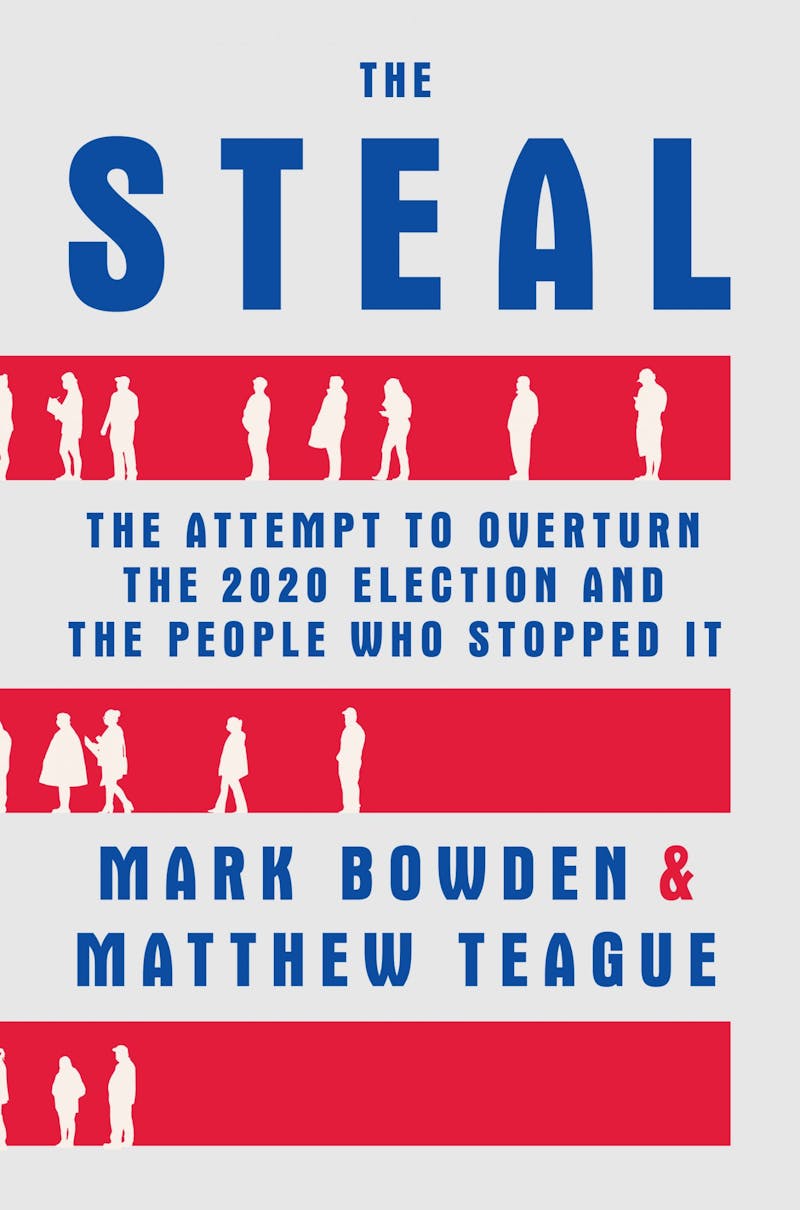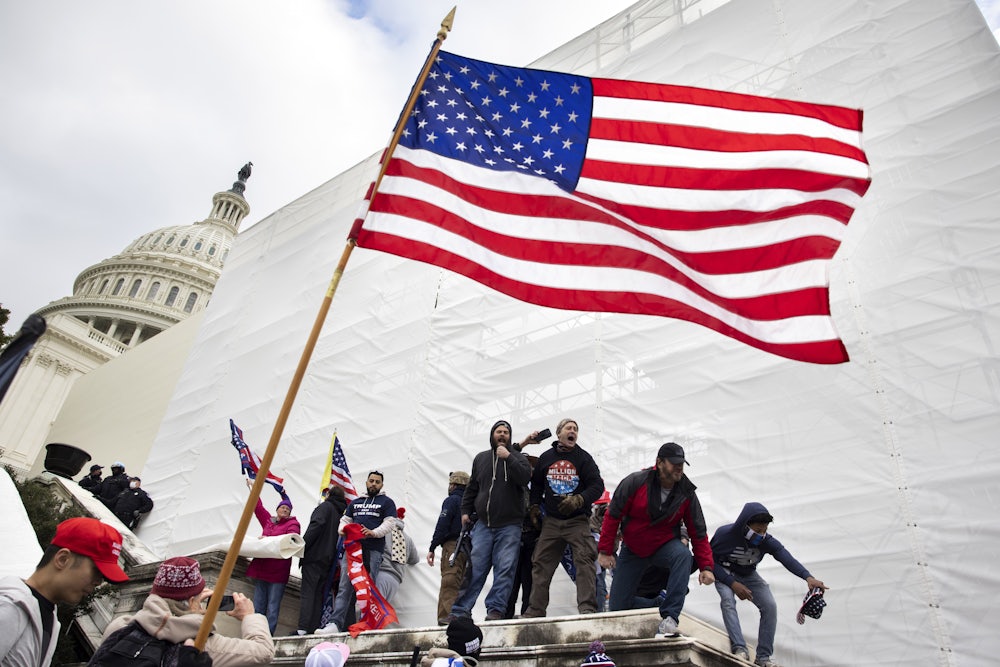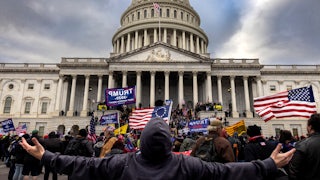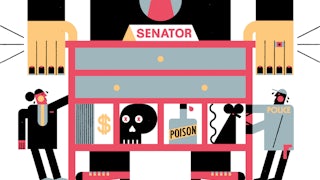Over the course of the last year, the events of January 6, 2021, have fully entered the arena of contested meaning that makes so much political discourse in America so frustrating and intolerable. Some would style it as 1/6, attempting to present an event that was quite terrible enough on its own merits as a new, domestic 9/11—as if the deleterious consequences of our wild, bloody national response to that awful day do not continue to plague us 20 years on. Some would dismiss the very real and very frightening reality of an agitated mob storming the U.S. Capitol as either a hysterical, media-created spectacle, an ordinary image of American protest, or, in some of the wilder corners of conservative media, a false-flag operation of either the Deep State or the radical left.

For those who view January 6 essentially as a failed coup, it has come to stand as a vast metonym for an even greater fascist threat to America. For skeptics, both conservatives and among certain segments of the political left, it was mostly a clown show, a goofball pantomime of revolution. It is of course possible—and likely—that both are true in some measure. Marx’s oft-misquoted line about the recurrence of “world-historical” facts and people, “first as tragedy, the second time as farce,” isn’t quite right. Most of the important events in history are both tragic and farcical, at the same time.
Most of the mainstream press seems to have adopted the word “insurrection” for what transpired last January, and I will use it here. It was a sudden eruption, but it wasn’t without tremors that warned of the explosion in advance. In that regard, Mark Bowden and Matthew Teague’s brisk new book, The Steal, is a useful—if somewhat limited—document. An account of the months leading up to January’s Capitol riot—from the final weeks of the campaign during which a trailing Donald Trump leaned heavily and publicly into the message that any electoral defeat could only be the result of “massive fraud” to the Election Day antics of Trump-backing, would-be poll watchers in battleground states; from Fox News calling Arizona for Biden to subsequent months of increasingly deranged legal maneuvering—The Steal attempts to collate the many disparate, diffuse, and often uncoordinated attempts of loyalist Republican officials, crackpot attorneys, and Facebook-obsessed, regular-Joe foot soldiers for what has come to be called Trumpism. The book performs a service in gathering the many significant events and players in the various efforts to undo Donald Trump’s 2020 loss into a single volume. If its attempts to craft a coherent narrative mostly fail, that is because there isn’t one to tell. Nevertheless, The Steal is a useful diagnostic tool. It cannot tell us precisely what happened in the attempt to overturn the 2020 election, but it presents several fascinating portraits of some individuals who joined the attempts, and, though the reasons are not always satisfying, reports why they did.
Surprisingly, the authors largely omit January 6 itself from their narrative, a decision that is confusing and a bit bizarre. The book is written in the cinematic, crosscutting style of an airport thriller (fittingly, perhaps, since Bowden is most famous as the author of Black Hawk Down), and the absence of the actual, attempted insurrection leaves a strange lacuna. Jumping from counting rooms to courthouses, from Arizona to Michigan to Georgia to Washington, D.C., The Steal has a thriller’s deliberately propulsive quality, a sense that several simultaneous narrative strands will eventually, surely, converge in a climactic action sequence. Yet the climax never materializes, as The Steal treats January 6 mostly in passing and then skips to a post-insurrection dénouement—although at least one of the book’s main characters, a Pennsylvanian poll watcher and GOP committeeperson named Leah Hoopes, receives an FBI visit based on an apparently false tip that she was at the riot herself.
On rereading, the choice makes more sense. The Steal attempts to wrestle the variegated efforts to undo Trump’s loss into a story that progresses from his supporters’ vague, often individual misgivings about the validity or security of the election to efforts to find fraudulent ballots in the vote totals, pressure campaigns against state election officials, postvote “audits,” and multiple lawsuits. But the tale remains scattershot. The authors acknowledge as much, referring to the constellation of efforts as a “Blunderbuss strategy,” if it can even be called a “strategy.” Shoot wildly and see if you hit anything certainly seems to have been the animating principle in Trump-world. It is clear that Trump himself—no less yet his core of advisers and his Rudy Giuliani–led legal team—had no plan to speak of. Like so much of Trumpism, an ideology that’s always had a tenuous claim to “-ism” status, the attempt to steal the presidency back from an electoral loss, and the many villains, malefactors, and dupes involved in the grand caper, were driven almost entirely by vibes.
Bowden and Teague are correctly sensitive to this tendency. To characters like Leah Hoopes, their individual small followings in their towns, and their online communities, theories of electoral fraud and theft were a matter of intuition, of gut. If she “wasn’t in a position to actually know if they were valid,” nevertheless they “sounded right. They at least deserved to be looked into, right?” Fact-checking and debunking, especially by the hated MSM, only served to strengthen underlying convictions that a great fraud was being perpetrated by the enemies of a movement.
These characters, the small individuals who found themselves swept up by a mass political movement, often for the first time in their lives, form the heart of this book. I would have gladly read hundreds more pages of interviews with them over slogging my way through another retelling of the farcical machinations of Giuliani and Sidney Powell or another regurgitation of the doomed press conference at “Four Seasons Total Landscaping,” with the requisite detail that, yes, it was right next to an adult bookstore.
Some of them were the sorts of people Joan Didion famously described, some 30 years ago, as those never destined to be “communicants” in “the process” of democracy. There was, for instance, Lynie Stone, an animal chiropractor from Arizona who “didn’t like to vote” and “didn’t trust voting,” who, in 2016, had “prayed and meditated and set an intention that Donald Trump would win.” And it had worked! And so, in 2020, she voted, and encountered a complicated, mystifying system that impelled her to embrace a form of political activism that, however deranged and incorrect, gave her meaning and a sense of belonging.
Others, like Leah Hoopes, had been involved in conservative politics, at least on a local level. But now, they found themselves drawn into a movement that conferred a sense of specific purpose and identity that they had lacked, even as their on-the-ground encounters with the actual processes of America’s crackpot, Rube Goldberg–machine election system proved unsurprisingly alienating to political conservatives already primed by the President himself to distrust legacy systems and institutions.
When Hoopes and fellow poll watcher Greg Stenstrom try to force their way into a Southeastern Pennsylvania counting center, they are rebuffed with laughter. There are few psychological torments in daily life as upsetting as being made to feel ridiculous. This instance had the ironic outcome of binding Hoopes and Stenstrom even closer to the figurehead whose lies and prevarications had driven them into such encounters, as they saw face-to-face what they perceived as a universe of liberals and professionals who held them in utter, personal contempt.
Even for some individuals who did have a firmer connection to electoral politics in America, this heady period provided an opportunity to be elevated out of mere mundanity and to achieve a level of significance in the life of the nation. There was, for example, Bill Feehan, a Republican Party chairman in Wisconsin’s Third District and a member of Wisconsin’s competing slate of Trump electors, who found himself “starstruck” when in mid-November he received a call from Sidney Powell: “a lawyer for the President of the United States, calling him!” This is an easy sentiment to mock in retrospect. Powell has emerged as a uniquely outlandish figure of fun, whom even Donald Trump has now discarded in a characteristic “I don’t even know her” moment. But one can see how, in the moment, a state-level figure would be feel flattered and elevated by so apparently close a connection to the president.
It is these petit bourgeois, true believers who gave the monthslong attempt to overturn Biden’s plain victory its protean quality, but who also gave it the quality of ridiculousness that made it easy to dismiss, just as “Tea Party” protesters were once dismissed as goofs in Revolutionary War garb and we now dismiss anti-vax protesters of Manhattan chain restaurants. Trump’s concurrent legal and political efforts—suing everybody and pressuring state and local Republican elections officials—were mostly “failing bigly.” (The Steal is regrettably fond of trying to turn Trump’s sillier locutions against him, like a bad SNL skit.) State legislators proved somewhat more amenable to scammy vote “audits” and plans to set aside their states’s popular votes and impanel their own preferred, Trump-friendly slate of electors. These efforts failed, often comically: The puckishly named “Cyber Ninjas” firm, for example, conducted an audit of the Arizona vote that, as we now know, showed a slight uptick in votes for Joe Biden. But the courts were uninterested, and those stodgy Republican rule-followers, perhaps most famously Georgia Secretary of State Brad Raffensperger, proved resistant to pressure from the administration and, in some cases, quite harrowing levels of personal and family harassment. The dam held, but barely.
Bowden and Teague are occasionally at pains to point out that elections are extremely complicated and go so far as to call national elections “a biannual miracle,” but this is a parochial American view. In reality, no other advanced democracy—indeed, not even many developing ones—experiences anything like the problems of our chaotic, locally administered system. Despite Germany’s complex, multiparty system, the results of federal elections there are often known within an hour of polls closing. But in the U.S., where every state—in some cases every county or municipality—has its own idiosyncratic ballot designs, local candidates and referenda, voting machines, volunteers, and boards of elections (not to mention notoriously unreliable exit polling), formally counting votes can drag on for days, even weeks, and standards and practices that are at once opaque and variable breed mistrust among partisans. The American electoral system itself, in which the national popular vote decides neither the presidency nor control of the legislature, is also almost perfectly designed to exacerbate disorganization and doubt.
There is an unfortunate tendency in this book, and in liberal commentary in general, to overstate the uniqueness of the partisan contestation of election results in this country today. “Never in America’s history,” the authors proclaim, “had a presidential candidate argued that the whole nation had been swindled.” This is a tendentious claim to make, especially about the era before modern elections. Trump was in some senses a throwback to a nineteenth century, when the complex interactions between voters, electors, state legislators, and regional election officials were more openly combative than they have been recently. (And of course, as Republicans are quick to point out, many liberals did view the 2000 election of George W. Bush as an illegitimate swindle, even if Al Gore himself ultimately conceded.)
The reality is that incoherent efforts to overturn the 2020 election were likely a prelude to a far more organized effort in the future. It is hard to overstate the zealous belief of the converted, and in the months since “the Steal” failed, these new communicants in the process have begun steadily and systematically making their way into the apparatus of elections, taking over for departing officials and making common cause with radicalized state legislators. The current president and Democratic leaders have proven incapable of addressing practical issues of voting rights and election reform.
Meanwhile, the Republican Party is already working on making the system more favorable to itself: The party as currently constituted simply cannot win a national popular vote and is therefore materially and structurally committed to minoritarian rule, including the use of state-level control of the elections apparatus to ensure their preferred slate of electors in future contests in so-called battleground states. While there is some reason for optimism—Biden has appointed more judges in his first year than any president in the last four decades—the rightward drift of the federal judiciary over recent decades and the Republican stranglehold on many important state legislatures are concerning to say the least.
Of revolutions, Hegel said: “By repetition that which at first appeared merely a matter of chance and contingency, becomes a real and ratified existence.” What at first appears extraordinary becomes ordinary; outliers become routine. The idea of “contested” election results (already somewhat normalized, we should not forget, by the 2000 Bush–Gore election) has already begun to feel routine. The idea that a presidency may be decided not by popular vote, not even by the routine operation of the electoral college, but through some combination of votes, legal maneuvering, and state-level political power, gets reinvented, ironically, as a great national tradition. It is happening before our eyes, and we should probably not just look away.






